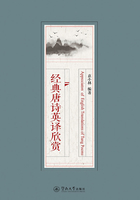
26.大林寺桃花
人间四月芳菲尽,山寺桃花始盛开。
长恨春归无觅处,不知转入此中来。
中文解读
此诗作于唐宪宗元和十二年(817年)四月。白居易时任江州(今江西九江)司马,年四十六。初夏四月诗人来到庐山大林寺,此时山下芳菲已尽,而不期在山寺中遇上了一片刚盛开的桃花。原来春并未归去,不过是转到这山寺里来了。
这首诗中,诗人不仅用桃花代替抽象的春光,把春光写得具体可感,形象美丽;而且还把春光拟人化,把春光写得仿佛真是有脚似的,可以转来躲去。岂止是有脚而已,它简直还具有顽皮惹人的性格呢。在这首短诗中,自然界的春光被描写得如此生动具体,活灵活现,如果没有诗人对春的无限留恋、热爱,没有诗人的一片童心,是写不出来的。这首小诗的佳处,正在立意新颖,构思灵巧,而戏语雅趣,又启人神思,惹人喜爱,可谓唐人绝句小诗中的珍品。
白话译文
在人间四月里百花凋零已尽,高山古寺中的桃花才刚刚盛开。
我常为春光逝去无处寻觅而怅恨,却不知它已经转到这里来。
英译一
Da Lin Temple Peach Blossoms
Translated By Dong Bo
This May in the world down below their fragrance is gone,
Here by the mountain temple peaches just begin to blossom.
I thought that spring had fled,
Didn't realize that up here it still blooms!
(fragrance n.芳香)
英译二
Peach Blossoms in the Temple of Great Forest
Translated by Xu Yuanchong
All flowers in late spring have fallen far and wide,
But peach blossoms are full-blown on the mountainside.
I often regret spring's gone and I can't find its trace,
Without knowing it's come up to adorn this place.
(adorn v.装饰,使……生色)
英译欣赏
好的译文不仅可以给读者带来美好的享受,还可以增加读者对原诗的理解,这首诗的英译就是这样。英译一是网友东波所译,译文第二、四句押韵,英文意思简洁易懂,以直译为主。英译二是北京大学许渊冲教授的翻译,采用aabb押韵,以意译为主,整个译文传神合意,朗朗上口。
“人间四月芳菲尽”,英译一:This May in the world down below their fragrance is gone;英译二:All flowers in late spring have fallen far and wide,这里的“人间”指的是山下的世界,英译二取其意,不直译。“四月”英译一用This May,英译二译成late spring,都无不可。
“山寺桃花始盛开”,英译一:Here by the mountain temple peaches just begin to blossom,似乎强调“始”。英译二:But peach blossoms are full-blown on the mountainside,似乎强调“盛开”。
两个译文角度不同,特点不同。
“长恨春归无觅处”,英译一:I thought that spring had fled,似乎简单,没有表达出“恨”之意,更没有体现“无觅处”的意思。英译二:I often regret spring's gone and I can't find its trace,意思表达准确到位。
“不知转入此中来”,英译一:I thought that spring had fled, Didn't(=I didn't)realize that up here it still blooms, thought表示以前错误的想法,意指我原来以为,与后面的I didn't realize(但是没有想到)呼应。英译二:I often regret spring's gone and I can't find its trace, Without knowing it's(=it has)come up to adorn this place,这样的英文更显意味深长,读者可仔细品味。
思考
英文应该怎样表达才能更好地表达诗中“长恨”之意?